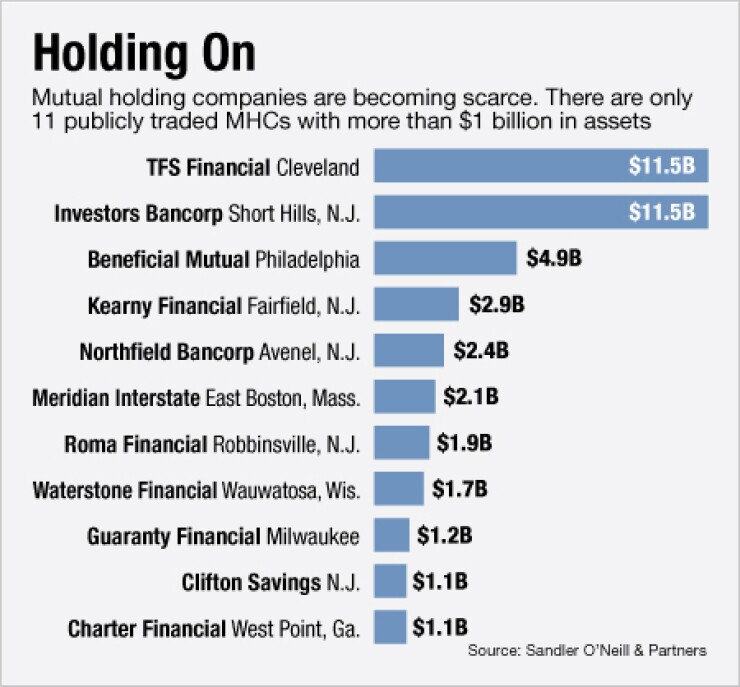-
Sound Financial in Seattle is nearing its conversion a fully stock-owned company.
August 20 -
Second-step conversions by mutual holding companies have been in a freeze since last summer, but at least one analyst believes that the market is set to thaw.
April 16 -
Mutual thrifts looking to convert to publicly traded companies run the risk of increased pressure from activist investors. While the conversion process alone makes it easier for dissidents to accumulate shares, some observers say mutuals are also suffering from lax enforcement of rules designed to protect them.
August 17 -
Some analysts believe the time is ripe for second-step conversions by mutual holding companies. Still, some bankers believe the floodgates will remain closed until regulators decide to let MHCs pay a special dividend before converting.
April 17

It seems as though everyone is jumping off a sinking ship when it comes to mutual holding companies. Mutual thrifts are steadily converting to stock companies, and few institutions have adopted the MHC model in recent years.
Then there's Kenneth Martinek, the chairman, president and chief executive of Northeast Community Bancorp (NECB) in White Plains, N.Y. Martinek is a staunch supporter of the mutual holding company format. The problem, he says, is that regulators and activist investors won't leave him alone to run his $453 million-asset thrift.
"As an MHC, we can still look to the long-term view, instead of worrying quarter-to-quarter," Martinek says.
Martinek has a lot riding on that statement. He is a defendant in a lawsuit alleging that he and his brother, Charles Martinek, a thrift vice president and internal loan review officer, are clinging to the MHC model to retain company control, to the detriment of its public shareholders and in violation of New York state law.
Martinek is also jousting with the Federal Reserve Board, sending a letter to the Fed last year arguing that a regulation required by the Dodd-Frank Act tied to dividends jeopardizes the existence of all MHCs.
Martinek is swimming against the tide. This week, Sound Financial of Seattle
Malvern Federal Bancorp (MLVF) in Paoli, Pa., has received "conditional regulatory approval" to convert in October. At least two more MHCs are planning to convert later this year: LaPorte Bancorp (LPSB) in Indiana and Polonia Bancorp (PBCP) in Huntingdon Valley, Pa.
The economy's gradual improvement is driving the rise in conversions, says Frank Schiraldi, an analyst at Sandler O'Neill & Partners. "We are in the beginning stages of another wave of second-step conversions, similar to what we saw in late 2009 through 2010," he says.
MHCs are also limited in how they can raise capital, says Jim Fleischer, a lawyer at Silver Freedman & Taff. Instead of paying dividends to shareholders, MHCs can repurchase stock, which is appealing to investors, but that can only work for so long, he says.
"At some point, liquidity in the MHCs stock is going to be gone, because an MHC can't buy back stock forever," Fleischer says.
Economic forces aside, some MHCs have been pushed by outsiders to convert. Activists are
Activist investor Joseph Stilwell has targeted Malvern Federal and Sound Financial.
Northeast also knows Stilwell. He is the plaintiff in a lawsuit, filed in the Supreme Court for the state of New York, that accuses Martinek of using the MHC structure to stay in power. The Martineks and other Northeast directors "place their loyalty to [the] MHC's interests over Northeast's minority shareholders' interests," breaching their fiduciary duty, Stilwell's lawyer, Spencer Schneider, wrote in a court filing.
Schneider declined to comment further.
An issue in Northeast's legal battle involves
MHCs waive dividends to attract outside investors. Without the incentive, MHCs will struggle to raise capital.
The Fed has given mixed signals. Charter Financial (CHFN) in West Point, Ga., said in April that the Atlanta Fed approved its dividend waiver. On Aug. 13, Charter said it would buy back common stock instead of paying a dividend because of uncertainty about the ability of its MHC "to waive the receipt of dividends due to changes in regulation or policy by the" Fed.
Barbara Hagenbaugh, a Fed spokeswoman, declined to comment on the dividend waiver issue.





